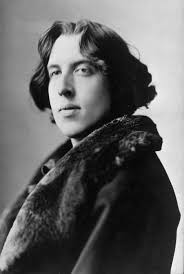The Picture of Dorian Gray Page #13
The Picture of Dorian Gray is a Gothic and philosophical novel by Oscar Wilde, first published complete in the July 1890 issue of Lippincott's Monthly Magazine. Fearing the story was indecent, prior to publication the magazine's editor deleted roughly five hundred words without Wilde's knowledge.
Lord Henry laughed and rose. "I am going to the park," he cried. As he was passing out of the door, Dorian Gray touched him on the arm. "Let me come with you," he murmured. "But I thought you had promised Basil Hallward to go and see him," answered Lord Henry. "I would sooner come with you; yes, I feel I must come with you. Do let me. And you will promise to talk to me all the time? No one talks so wonderfully as you do." "Ah! I have talked quite enough for to-day," said Lord Henry, smiling. "All I want now is to look at life. You may come and look at it with me, if you care to." CHAPTER 4 One afternoon, a month later, Dorian Gray was reclining in a luxurious arm-chair, in the little library of Lord Henry's house in Mayfair. It was, in its way, a very charming room, with its high panelled wainscoting of olive-stained oak, its cream-coloured frieze and ceiling of raised plasterwork, and its brickdust felt carpet strewn with silk, long-fringed Persian rugs. On a tiny satinwood table stood a statuette by Clodion, and beside it lay a copy of Les Cent Nouvelles, bound for Margaret of Valois by Clovis Eve and powdered with the gilt daisies that Queen had selected for her device. Some large blue china jars and parrot-tulips were ranged on the mantelshelf, and through the small leaded panes of the window streamed the apricot-coloured light of a summer day in London. Lord Henry had not yet come in. He was always late on principle, his principle being that punctuality is the thief of time. So the lad was looking rather sulky, as with listless fingers he turned over the pages of an elaborately illustrated edition of Manon Lescaut that he had found in one of the book-cases. The formal monotonous ticking of the Louis Quatorze clock annoyed him. Once or twice he thought of going away. At last he heard a step outside, and the door opened. "How late you are, Harry!" he murmured. "I am afraid it is not Harry, Mr. Gray," answered a shrill voice. He glanced quickly round and rose to his feet. "I beg your pardon. I thought--" "You thought it was my husband. It is only his wife. You must let me introduce myself. I know you quite well by your photographs. I think my husband has got seventeen of them." "Not seventeen, Lady Henry?" "Well, eighteen, then. And I saw you with him the other night at the opera." She laughed nervously as she spoke, and watched him with her vague forget-me-not eyes. She was a curious woman, whose dresses always looked as if they had been designed in a rage and put on in a tempest. She was usually in love with somebody, and, as her passion was never returned, she had kept all her illusions. She tried to look picturesque, but only succeeded in being untidy. Her name was Victoria, and she had a perfect mania for going to church. "That was at Lohengrin, Lady Henry, I think?" "Yes; it was at dear Lohengrin. I like Wagner's music better than anybody's. It is so loud that one can talk the whole time without other people hearing what one says. That is a great advantage, don't you think so, Mr. Gray?" The same nervous staccato laugh broke from her thin lips, and her fingers began to play with a long tortoise-shell paper-knife. Dorian smiled and shook his head: "I am afraid I don't think so, Lady Henry. I never talk during music--at least, during good music. If one hears bad music, it is one's duty to drown it in conversation." "Ah! that is one of Harry's views, isn't it, Mr. Gray? I always hear Harry's views from his friends. It is the only way I get to know of them. But you must not think I don't like good music. I adore it, but I am afraid of it. It makes me too romantic. I have simply worshipped pianists--two at a time, sometimes, Harry tells me. I don't know what it is about them. Perhaps it is that they are foreigners. They all are, ain't they? Even those that are born in England become foreigners after a time, don't they? It is so clever of them, and such a compliment to art. Makes it quite cosmopolitan, doesn't it? You have never been to any of my parties, have you, Mr. Gray? You must come. I can't afford orchids, but I spare no expense in foreigners. They make one's rooms look so picturesque. But here is Harry! Harry, I came in to look for you, to ask you something--I forget what it was--and I found Mr. Gray here. We have had such a pleasant chat about music. We have quite the same ideas. No; I think our ideas are quite different. But he has been most pleasant. I am so glad I've seen him." "I am charmed, my love, quite charmed," said Lord Henry, elevating his dark, crescent-shaped eyebrows and looking at them both with an amused smile. "So sorry I am late, Dorian. I went to look after a piece of old brocade in Wardour Street and had to bargain for hours for it. Nowadays people know the price of everything and the value of nothing." "I am afraid I must be going," exclaimed Lady Henry, breaking an awkward silence with her silly sudden laugh. "I have promised to drive with the duchess. Good-bye, Mr. Gray. Good-bye, Harry. You are dining out, I suppose? So am I. Perhaps I shall see you at Lady Thornbury's." "I dare say, my dear," said Lord Henry, shutting the door behind her as, looking like a bird of paradise that had been out all night in the rain, she flitted out of the room, leaving a faint odour of frangipanni. Then he lit a cigarette and flung himself down on the sofa. "Never marry a woman with straw-coloured hair, Dorian," he said after a few puffs. "Why, Harry?" "Because they are so sentimental." "But I like sentimental people." "Never marry at all, Dorian. Men marry because they are tired; women, because they are curious: both are disappointed." "I don't think I am likely to marry, Harry. I am too much in love. That is one of your aphorisms. I am putting it into practice, as I do everything that you say." "Who are you in love with?" asked Lord Henry after a pause. "With an actress," said Dorian Gray, blushing. Lord Henry shrugged his shoulders. "That is a rather commonplace debut." "You would not say so if you saw her, Harry." "Who is she?" "Her name is Sibyl Vane." "Never heard of her." "No one has. People will some day, however. She is a genius." "My dear boy, no woman is a genius. Women are a decorative sex. They never have anything to say, but they say it charmingly. Women represent the triumph of matter over mind, just as men represent the triumph of mind over morals." "Harry, how can you?" "My dear Dorian, it is quite true. I am analysing women at present, so I ought to know. The subject is not so abstruse as I thought it was. I find that, ultimately, there are only two kinds of women, the plain and the coloured. The plain women are very useful. If you want to gain a reputation for respectability, you have merely to take them down to supper. The other women are very charming. They commit one mistake, however. They paint in order to try and look young. Our grandmothers painted in order to try and talk brilliantly. Rouge and esprit used to go together. That is all over now. As long as a woman can look ten years younger than her own daughter, she is perfectly satisfied. As for conversation, there are only five women in London worth talking to, and two of these can't be admitted into decent society. However, tell me about your genius. How long have you known her?"
Translation
Translate and read this book in other languages:
Select another language:
- - Select -
- 简体中文 (Chinese - Simplified)
- 繁體中文 (Chinese - Traditional)
- Español (Spanish)
- Esperanto (Esperanto)
- 日本語 (Japanese)
- Português (Portuguese)
- Deutsch (German)
- العربية (Arabic)
- Français (French)
- Русский (Russian)
- ಕನ್ನಡ (Kannada)
- 한국어 (Korean)
- עברית (Hebrew)
- Gaeilge (Irish)
- Українська (Ukrainian)
- اردو (Urdu)
- Magyar (Hungarian)
- मानक हिन्दी (Hindi)
- Indonesia (Indonesian)
- Italiano (Italian)
- தமிழ் (Tamil)
- Türkçe (Turkish)
- తెలుగు (Telugu)
- ภาษาไทย (Thai)
- Tiếng Việt (Vietnamese)
- Čeština (Czech)
- Polski (Polish)
- Bahasa Indonesia (Indonesian)
- Românește (Romanian)
- Nederlands (Dutch)
- Ελληνικά (Greek)
- Latinum (Latin)
- Svenska (Swedish)
- Dansk (Danish)
- Suomi (Finnish)
- فارسی (Persian)
- ייִדיש (Yiddish)
- հայերեն (Armenian)
- Norsk (Norwegian)
- English (English)
Citation
Use the citation below to add this book to your bibliography:
Style:MLAChicagoAPA
"The Picture of Dorian Gray Books." Literature.com. STANDS4 LLC, 2025. Web. 16 Mar. 2025. <https://www.literature.com/book/the_picture_of_dorian_gray_869>.








Discuss this The Picture of Dorian Gray book with the community:
Report Comment
We're doing our best to make sure our content is useful, accurate and safe.
If by any chance you spot an inappropriate comment while navigating through our website please use this form to let us know, and we'll take care of it shortly.
Attachment
You need to be logged in to favorite.
Log In